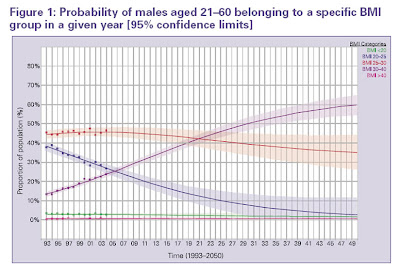 A no no: people should try to avoid bacon, the study urges |
Even those who are not overweight should slim down if they want to cut their risk of cancer,a major international study - Food, Nutrition,
Physical Activity, and the Prevention of Cancer: a global Perspective, has claimed.
The World Cancer Research Fund WCRF carried out the largest ever inquiry into lifestyle and cancer, and issued several stark recommendations.
They include not gaining weight as an adult, avoiding sugary drinks and alcohol, and not eating bacon or ham.
Everyone must also aim to be as thin as possible without becoming underweight.
People with a Body Mass Index (BMI), a calculation which takes into account height and weight, of between 18.5 and 25, are deemed to be within a "healthy" weight range.
![]()
![]() Cancer is not a fate, it is a matter of risk, and you can adjust those risks by how you behave. It is very important that people feel that they are in control of what they do
Cancer is not a fate, it is a matter of risk, and you can adjust those risks by how you behave. It is very important that people feel that they are in control of what they do ![]()
Report author![]()
But the study says their risk increases as they head towards the 25 mark, and that everyone should try to be as close to the lower end as possible.
There is no new research involved in this document: the panel examined 7,000 existing studies over five years.
The result, they say, is the most comprehensive investigation ever into the risks of certain lifestyle choices.
![]()
They see body fat as a key factor in the development of cancer, estimating its significance to be much higher than previously thought.
The report's authors say they have produced a list of recommendations, not "commandments".
"But if people are interested in reducing their cancer risk, then following the recommendations is the way to do it," said Professor Martin Wiseman.
"Cancer is not a fate, it is a matter of risk, and you can adjust those risks by how you behave. It is very important that people feel that they are in control of what they do."
Making cuts
However, two-thirds of cancer cases are not thought to be related to lifestyle, and there is little people can do to prevent the disease in these circumstances.
![]()
Nevertheless, more than three million of the 10 million cases of cancer which are diagnosed across the world each year could be prevented if the recommendations were followed,
Professor Wiseman indicated.
In the UK alone, there are 200,000 new cases of cancer each year.
Cancers of the colon and breast are some of the most common forms of the disease, and the report says the evidence is "convincing" that body fat plays a key role in the development of these tumours.
The report also links the kind of food consumed to cancers, especially colorectal ones.
In particular, researchers say people should stop eating processed meats, such as ham, bacon and salami, and limit the consumption of red meat to 500g a week - although this still means you could eat, for instance, five hamburgers each week.
![]()
![]() Alcohol, red meat and bacon in moderation will do us no harm, and to suggest it will is wrong
Alcohol, red meat and bacon in moderation will do us no harm, and to suggest it will is wrong ![]()
Cancer specialist![]()
From a cancer perspective, all alcohol should be avoided, although researchers accepted drinking small amounts could have protective benefits for other diseases.
The recommendation is therefore no more than two drinks a day for a man, and no more than one for a woman, slightly less than current UK government guidelines.
Sugary drinks meanwhile should be avoided, as these make you fat, and fruit juice consumption should also be reduced.
The report is also the first to urge breastfeeding as a means to protect against cancer, arguing that it may reduce breast cancer in the mother and prevent obesity in the child - although this has not been proven.
Cancer specialist Professor Karol Sikora said: "The educational message for the public should be that there are healthy diets and unhealthy diets but we should keep everything in perspective and not suggest rigid avoidance.
"Alcohol, red meat and bacon in moderation will do us no harm, and to suggest it will is wrong."
Antonia Dean, a specialist at Breast Cancer Care, said: "it is notoriously difficult to examine the potential role of diets or other lifestyle factors on breast cancer, as it is hard to isolate specific influences or establish how they might interact with each other.
"It is important that women keep the report findings in perspective - after gender, the highest known risk factor in relation to breast cancer is age, with 80 per cent of cases occurring in women over the age of 50."













